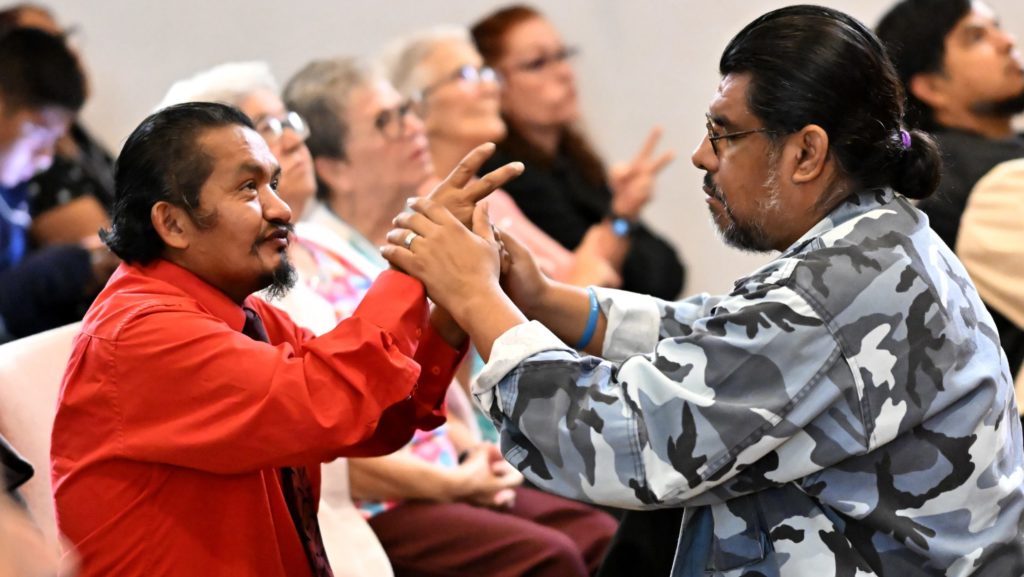Joanna Hinojosa-Martínez entered Holy Angels Catholic Church of the Deaf in Vernon for the first time nearly 30 years ago. Her mother, a devoted Catholic, was looking for an accessible Mass for her 8-year-old deaf child, who longed for a community.
Before discovering Holy Angels in 1996, her family had attended various parishes, but the barrier was always the same: language. Her mother bought her a crucifix to instill some sense of devotion, but young Joanna played with it instead. Her mother feared Joanna was disconnected from God and her faith.
But that Sunday morning, she recalled walking to Holy Angels with her family and leaving feeling very different from how she came: The first thing she noticed was that the priest himself, Holy Angels pastor Father Tom Schweitzer, was deaf. “You’re deaf just like me,” Joanna said.
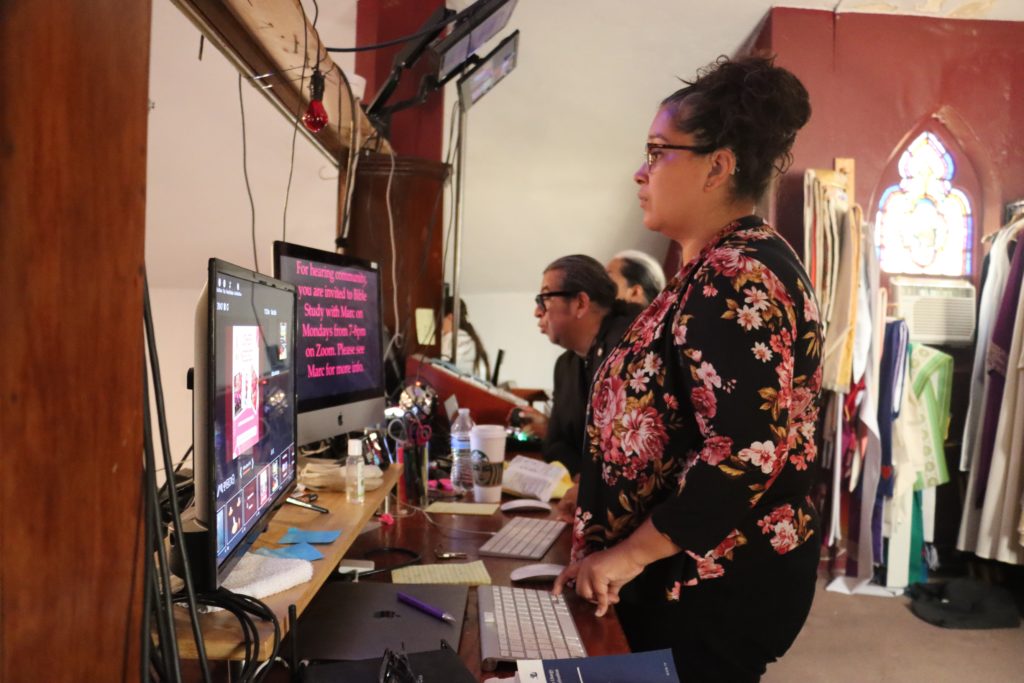
She saw how parishioners accompanied a deaf family member. She could understand the lectors who signed throughout the Mass. There were visuals on the wide screen above the altar, where American Sign Language (ASL) interpreters passionately conveyed hymns and readings. Most families signed and shared the gospel through ASL, and their smiles radiated a warmth that moved Martínez.
“It felt like home,” she remembered. “The Deaf became my role models, and they became my leaders.”
Before Holy Angels was officially established in 1987 by then-Archbishop Roger Mahony in the industrial heart of Vernon, and opened a year later, local deaf Catholics struggled to find a permanent place to practice their faith in ASL. They borrowed spaces in “hearing parishes,” but priests would sometimes forget about the scheduled deaf Masses.
Now, they have a church that provides accessibility, community, and a spiritual home for the Deaf community.
After 28 years of attending Holy Angels, Martínez was asked by Schweitzer to become its music and liturgy director in 2022. The role was a natural fit, given Holy Angels felt like a second home for so long.
“I got married at this church, my daughter got baptized at this church,” she said.
Despite recently leaving the job, Martínez still volunteers and speaks to Deacon Tomas Garcia, who has stepped into her role. There are five to six volunteers who assist during the Sunday Mass to ensure that the service runs smoothly. That means creating PowerPoint presentations with captions and graphics to help parishioners engage with the service and volunteers monitoring the video screens from the second floor and signaling to the priest and the team.
“We have a person responsible for managing the lights because it’s visually important for Deaf people to know where to focus,” Martínez said. “It’s all about visual cues and visual information; for the Deaf, the eyes are the windows to our soul.”
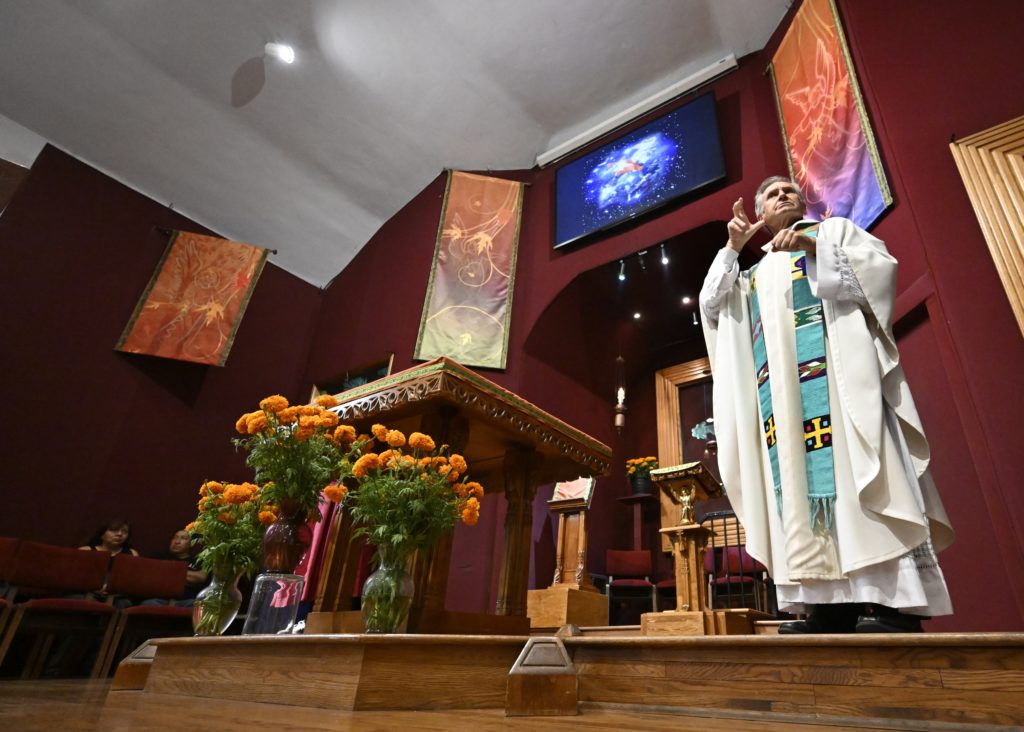
“Boom.”
“Boom.”
One volunteer strikes the drum while the music plays. The sound of drums vibrates through the church, allowing the Deaf and hard-of-hearing Catholics to feel the music.
When hearing parishioners attend this Mass, two volunteer interpreters communicate the service in both Spanish and English. The volunteer team also makes sure those unable to attend Mass in person can follow via Zoom.
Carlos Cobián grew up attending Spanish Mass with his family but couldn’t hear or fully understand. Everything changed in the mid-1990s, when, as a young adult, he also attended his first deaf Mass with a deaf priest — Father Tom.
“It felt beautiful,” he said. “I was finally able to understand the Eucharist, I was finally able to understand the Mass.”
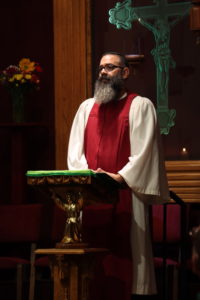
Cobián said the experience at Holy Angels helped him reconnect with his faith and understand the importance of the sacraments — and he’s been a parishioner ever since.
Cobián has also discovered another way to deepen his faith: the holy rosary. On Sundays, he implemented rosary time before Mass. Since the rosary requires two hands, he is working on making the rosary prayer more accessible for his deaf friends and bringing them closer to God.
Including everyone in prayer practices and helping every member of the HAC community connect with their faith is part of the parish’s mission, said Schweitzer, who has served more than 40 years as a priest at Holy Angels.
“I try to develop a better deaf liturgy,” Schweitzer said. “In strict sign language,” the person should only look at the person they are talking to. He emphasized the importance of connecting with the congregation while he celebrates Mass. Instead of looking at the lectionary, he looks at the projector across from him to read the Gospel and looks heavenward. If he were to read and sign, he said, deaf people would think he’s talking to the Bible, not God.
“Some will understand, but it’s not their language, it’s not their culture, it’s not their way,” he said. “It’s always the Deaf world coming into the hearing world, which is why there’s a deaf church, so everything can be translated to the Deaf world.”
“What am I doing here? Why am I here?” Garcia recalled asking himself the first time he went to confession at a parish without interpreter assistance.
His grandmother and uncle tried to inform the priest about their deaf child to no avail. Although he was allowed to receive his first Communion, the experience left him questioning his place within the church.
In 1987, he discovered Holy Angels, a place he said has given him a sense of community and purpose.
“This is where I belong. This is where I am supposed to be,” he said.
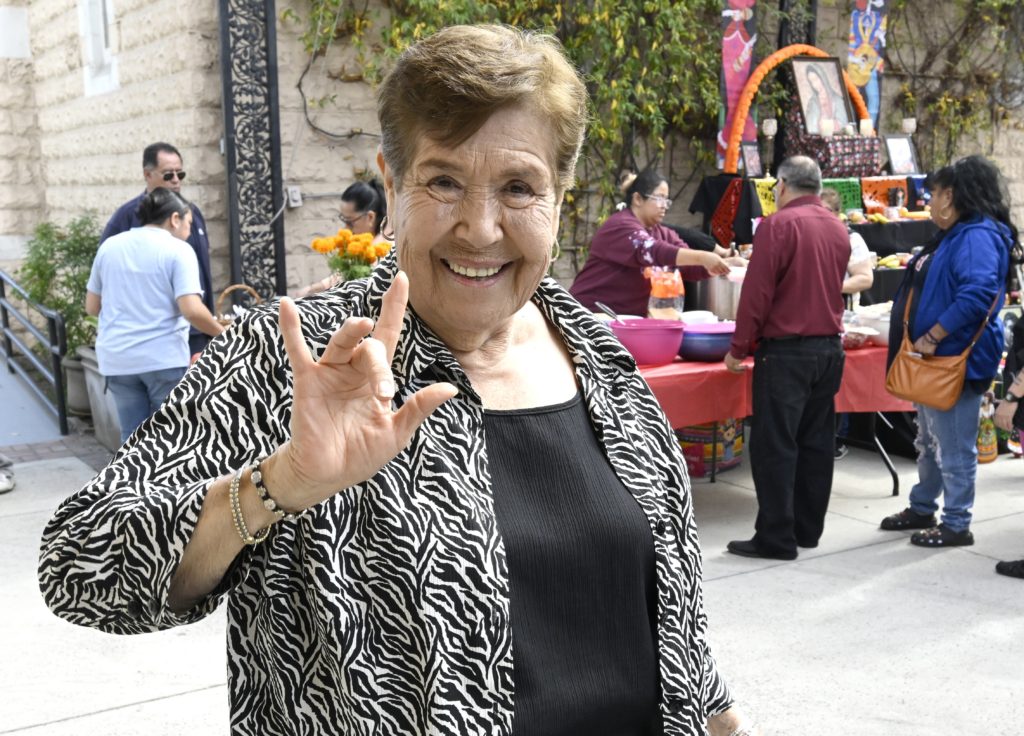
Closer to home, Garcia said he experienced stigma and neglect due to his deafness.
“It’s mostly the parents who are grieving and becoming emotionally distant from their child,” he said.
Garcia went on to be ordained a permanent deacon for the Archdiocese of Los Angeles. He’s also a psychologist and provides direct support to children who feel neglected by their parents at Holy Angels. He emphasized that there’s a breaking point where deaf children may say, “This isn’t my family, I want to leave,” though some families respond positively by making changes and learning ASL.
The parish also looks to support families who grieve over the idea that their deaf and hard-of-hearing children are “broken,” a term often used in the medical field, Garcia said.
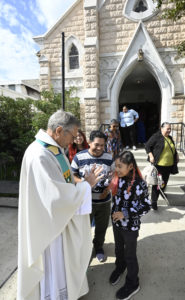
As a hearing person, Hilda Jimenez said it took many years to fully accept her family — which includes six deaf grandchildren and two deaf daughters — and rekindle her faith.
She sometimes recalled wondering, “What would they say?” and would hide from her friends and neighbors in Mexico. After immigrating to the U.S., she found something different at Holy Angels. Today, Jimenez said she sees her deaf family members as a blessing.
“I love this church, and I don’t think of ever leaving,” she said. “I surrendered to God, and he opened my heart.”
Jimenez has worked in the parish for 38 years. As a floor manager, Jimenez strives to stay connected with families and oversees day-to-day activities.
She sometimes encounters families who struggle with communication and lack empathy for their deaf children. Drawing from her own experiences, Jimenez works to build bridges between Hispanic families and their deaf children.
“Some parents say their children don’t understand them,” she said. In response, Jimenez encourages parents to learn their children’s language and embrace Deaf culture.
Building on Jimenez’s advice, Garcia explained the importance of family talleres (workshops) that the parish hosts to address these challenges. “We bring to light their wounds,’ he said.
“In Father’s homily about the Gospel of Jesus healing the deaf man,” Garcia said, reflecting on the priest’s message about fostering family connections and a call for unity. “What can we do as a family to have better communication and connection so we can be one?”
